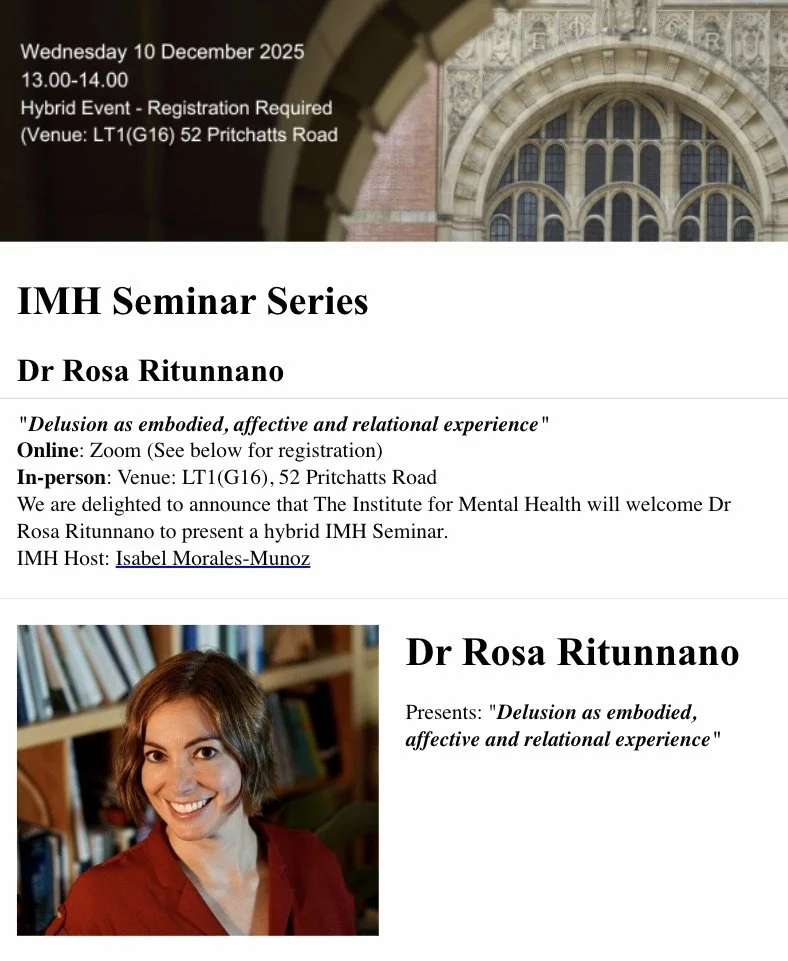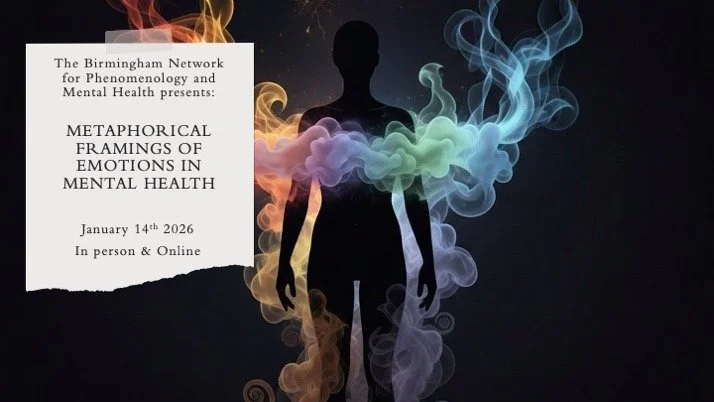Coming up…
Delusion as embodied, affective and relational experience
Dec 10, 2025 01:00 PM, Hybrid
In psychiatry, delusions are commonly understood as fixed, evidence-resistant beliefs. In this context, the attribution of delusional status usually relies on epistemic criteria such as falsity, implausibility, and conviction, as inferred by an external observer. Yet, like the experience of a person in pain, the experience of undergoing a delusion cannot be observed directly, since investigators lack immediate access to another’s bodily feelings and perceptions. We deal with ambiguous representations of it—most commonly in the form of written or spoken narratives. My goal in this talk is to show that delusions have too often been misrepresented as “erroneous” or “unfounded” ideas because their propositional content has been prematurely separated from their experiential and discursive context. Drawing on findings from a recent phenomenological and narrative study of first-episode psychosis, I will argue that some delusions can be better understood as coherent, expressive attempts at articulating situated emotional experiences between the self and other agent(s), such as intense shame, love, and awe, or experiences of disembodiment and ego dissolution.
Metaphorical Framings of Emotions in Mental Health
Emotions are important drivers of human behaviour. They help shape our goals and desires and endow our lives with meaning. Insights into emotional phenomena are central to our understanding of human subjectivity, suffering and flourishing. Phenomenological enquiries into emotions are valuable as they provide insight into our understanding of identity and selfhood (i.e. the network of interconnected values, projects and concerns that define who we are). They also reveal how identity and selfhood relate to our subjective understanding of the world we live in. Yet, certain dimensions of emotional experience remain underexplored in phenomenological research. These include the foundational role that metaphor and metonymy play in shaping the relationship between emotions and bodily experiences and, by extension, in shaping psychological (or psychopathological) phenomena such as delusions, hallucinations and other manifestations of mental health conditions.
Bringing together scholars from across philosophy, psychology, psychiatry and linguistics, the workshop will open up a new inter-disciplinary space for the theoretical reflection and methodological development.
All times are in GMT
9.30 Tea & Coffee and Registration
9.45 Introduction to the workshop (Dr Rosa Ritunnano & Prof. Jeannette Littlemore)
10.00 Metaphorical embodiment of emotions in psychosis, Dr Rosa Ritunnano (Institute for Mental Health, University of Birmingham) & Prof. Jeannette Littlemore (Dept. of Linguistics & Communication, University of Birmingham)
10.45 Metaphor and Epistemic Injustice in Mental Illness: An Experimental Approach, Prof. Francesca Ervas (Department of Education, Psychology, Philosophy Università degli Studi di Cagliari, Italy)
11.30 Tea & Coffee
12.00 Giving Uptake to the Metaphorical Meanings of Delusions, Dr Kathleen Murphy-Hollies (Department of Philosophy, University of Birmingham)
12.45 Lunch
13.45 “What is it that I am missing?” A Phenomenological Exploration of Metaphors in Schizophrenia Spectrum Disorders, Dr Francesca Brencio (Institute for Mental Health, University of Birmingham)
14.30 Tea & Coffee
15.00 Metaphor and Metonymy in Talk about Mental Health, Prof. Ray Gibbs (Independent Scholar, USA and Hungary)
15.50 Round Table Discussion
16.30 Workshop ends
Previous presentations, talks and symposia
Ritunnano, R. * (2025). “"The embodied, affective, and narrative world of delusions". Presented online at the Fourth instalment of The Salon, Departments of Psychiatry, Public Health, and Neuroscience at the University of Illinois at Chicago, April 14, 2025. *Invited
Ritunnano, R. * (2024). “Taking the person seriously in phenomenological psychopathology”. Presented in person at the Renewing Phenomenological Psychopathology Closing Event, Florence, March 1, 2024. *Invited
Ritunnano, R. (2024). “What do delusions do? From personal narratives to situated bodies, and back” Presented in person at the Delusions at the Intersection Workshop, Zurich, February 26, 2024.
Ritunnano, R. * (2023). “Delusion & Meaning: An interdisciplinary exploration spanning Philosophy, Psychiatry, Linguistics & Psychology.” Presented in person at the British Academy ECR Network, Birmingham, June 30, 2023. *Invited
Spencer, L., Baiasu, R., & Ritunnano, R. (2023). Workshop about the Renewing Phenomenological Psychopathology Project. Presented at the Too Mad to Be True International Conference on the Philosophy of Madness and the Madness of Philosophy. May 27, 2023, Ghent, Dr. Guislain Museum (online).
Ritunnano, R. (2022). “Investigating the Meaning of Delusions at the Intersection of Phenomenology and Applied Linguistics.” Paper presented at the Renewing Phenomenological Psychopathology Launch Event, University of Birmingham, October 14, 2022.
Ritunnano, R.* (2022). “Understanding delusional complexities in early psychosis: why meanings matter”. Paper presented as part of the invited symposium “Ethics and personal meaning in patients with early onset psychosis” (with Prof. Matthew Broome and Prof. Ilina Singh). WPA 2022 Thematic Congress on Early Intervention in Psychiatry across the Life Span, Athens, June 24, 2022. *Invited
Ritunnano, R.^, Fernandez, A.V., Feyaerts, J., Pienkos, L., Stanghellini G., & Broome M.R. (2022). “Phenomenological psychiatry today, and tomorrow: methods, applications and context.” Symposium presented at the Congress of the Schizophrenia International Research Society (SIRS), Florence, April 8, 2022. ^Symposium Chair and speaker
Ritunnano, R., Fernandez, A.V., & Broome M.R. (2021). « Hermeneutical Flexibility and Empathic Openness in the Clinical Encounter: The Case of Delusions.” Paper presented at the Philosophy SIG Biennial Conference “Implicit bias in psychiatric practice: what lessons can philosophy offer to practitioners, learners and educators?”. September 15, 2021 (online).
Ritunnano, R., Fernandez, A.V., & Broome M.R. (2021). « Making sense of delusions in the clinical encounter: can phenomenology remedy hermeneutical injustice?” Paper presented at the Too Mad to Be True International Conference on the Philosophy of Madness and the Madness of Philosophy. September 23, 2021, Ghent, Dr. Guislain Museum (online).
Ritunnano, R. (2020). “Can delusions have and give meaning?” Paper presented at the Institute for Mental Health Lunchtime Seminar series, University of Birmingham, December 14, 2020 (online).
Ritunnano, R. (2020). “Self, World and Meaning: Understanding Existential Changes in Early Psychosis.” Paper presented at the British Society for Phenomenology Annual Conference, University of Exeter, September 4, 2020 (online).
Ritunnano, R. (2020). “Delusion and Meaningfulness: a Phenomenological and Narrative Analysis.” Paper presented at the Third International Conference on Philosophy and Meaning in Life. University of Birmingham, July 22, 2020 (online).
Ritunnano, R. (2020). “How is meaning-making affected during the formation of delusions? A proposal for a qualitative study in first-episode psychosis.” Paper presented at the annual workshop organized by the Phenomenology and Mental Health Network, The Collaborating Centre for Values-based Practice in Health and Social Care, St. Catherine’s College, Oxford, June 12, 2020 (online).
Birchwood, M., Ritunnano R., Thompson, A., Upthegrove, R., De Santi, K., Bonetto, C., Cristofalo, D., Fioritti, A., Lasalvia, A., Tosato, S., Ruggeri, M. (2016). “From Childhood Adversity to First-Episode Psychosis: Associations Between Social Environment and Specific Symptom Profiles.” Paper presented at X IEPA Conference on Early Intervention in Mental Health “Looking back moving forward”. Milan, October 20-22, 2016.

